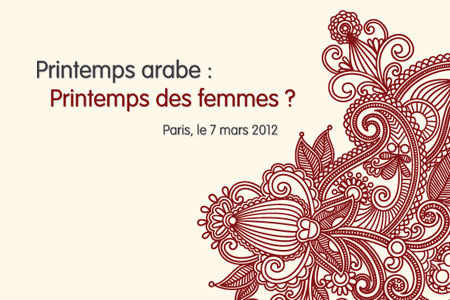March 7, Arab World Institute, PARIS - “The Egyptian Revolution continues to be youth driven and still seeks freedom and social justice for all”, but despite some young activist women on the front lines of the Revolution, adolescent girls, who constitute 11% of the population, are vulnerable, marginalized and “have generally been invisible from targeted national policies and programmes”. Invited by the French Ministry of Foreign and European Affairs to a conference for International Women’s Day, Mona Moustafa, Program Officer at the United Nations Population Fund in Egypt and representing the Adolescent GirlsTask Force in Egypt, summarized in those words the situation in Egypt since the 25th of January Revolution and presented UNFPA’s and other UN agencies efforts to advance the rights of adolescent girls.
The conference, called “Arab Spring: Spring for Women?” (« Printemps arabe: Printemps des femmes? ») was inaugurated by Ms. Roselyne Bachelot, FrenchMinister of Solidarity and Social Cohesion, and brought together ministers, parliamentarians and representatives from the world of research, civil society and UN agencies around four panel discussions: the place of women in politics and electoral processes; their role in the transitional justice process; their place on the labor market conditions and economic autonomy; education and advocacy of young women in the region.
Mona started her intervention depicting Egypt in this period of transition and explaining the necessity to hear the voice of the young people, as 40% of the Egyptian population is under the age of 29, and especially of the young girls, victims of violence and abuses.
Indeed, basing her speech on figures from the UNFPA supported Survey of Young People in Egypt, Mona Moustafa managed to capture the attention of the audience with very relevant examples on the situation of young women in Egypt:
- 3% of 10-14 year olds girls and 7% of 15-17 year old girls have never attended school;
- the unemployment rate is as high as 40% for girls in that age group compared to 15% for males;
- harmful practices such as female genital mutilation/cutting, although illegal, affect 64% of 10-14 year olds and 82% of 15-17 year olds;
- early marriage, also illegal, still takes place mainly in rural settings;
Facing these reality and threats, the UN Adolescent Girls Task Force in Egypt aims to empower marginalized adolescent girls and to create space and opportunity for them. Mona ended her speech on a hopeful note describing the global UN initiative that involves 22 countries and five UN agencies in Egypt-UNICEF, UNESCO, ILO, UN Women and UNFPA- to advance the rights of adolescent girls. The agencies will work together to produce more evidence based information targeting the most marginalized in specific communities through a comprehensive integrated approach. Focus group discussions will be conducted with the girls to feed into the evidence based information. The UN strategies include working with parents, future husbands, religious leaders and communities at large to create an enabling environment for adolescent girls to fulfill their potential.
Indeed, despite the huge challenges in a changed country “the UN in Egypt seeks to capture this momentum and capitalize collectively on its role as broker of quality technical assistance and a bridge between civil society and the Government”.
To go further, read Mona Moustafa’s Speech



